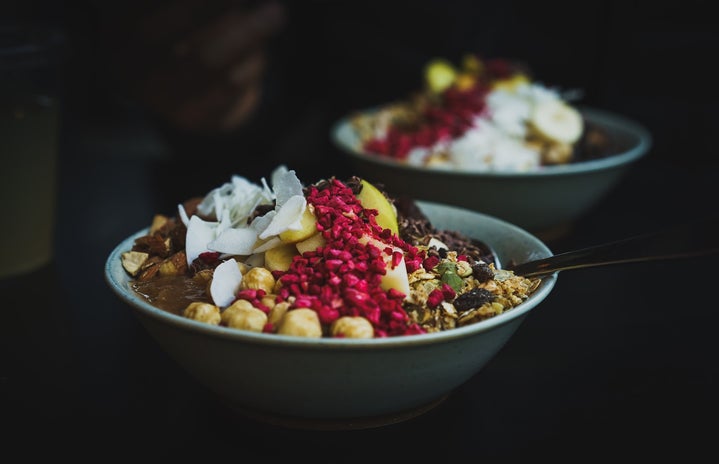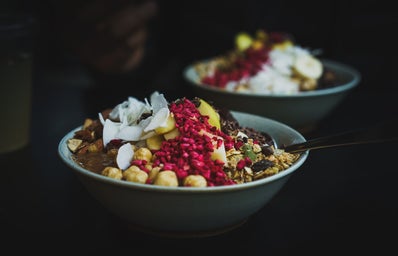As a college student, late night snacking is not only a habit, but is part of the lifestyle. If you’re anything like me, you eat dinner at 6PM just to become hungry later when you still have another 3-4 hours of homework before calling it a night. Unfortunately, in my head 10PM is not exactly the time for a salad, but rather I tend to reach for the less healthy options of chocolate, leftover pizza, or ice cream. Anyone else? Among other factors, I have found that these eating habits can lead to trouble falling or staying asleep. And when every second in bed is a valuable commodity for me, this can be especially frustrating.
So what late-night foods can help improve my sleep?
Whether you’ve noticed or not, the food we eat (or choose not to eat) in the hours before bedtime actually has a large impact on how we sleep. In general, it is recommended that you limit food intake within 2-3 hours before bedtime as it can cause other complications, such as acid reflux, if stomach digestion is still occuring when you go to bed.
DAIRY: We’ve all heard of the classic glass of warm milk to help insomniacs, but have you ever stopped to wonder what it is about warm milk that makes it promote better sleep? Milk, and in fact many other vegan-nightmare foods such as cottage cheese and unsweetened yogurt, are known sources of tryptophan and they promote the production of melatonin in the body. Both of these hormones play a critical role in making you feel sleepy and regulating your circadian rhythm.
WHITE MEAT: Other animal products like turkey and fatty fish meat can be beneficial as well due to their high and lean protein content. Additionally, greater levels of tryptophan in turkey help induce drowsiness, while the omega-3 fatty acids and vitamin D of fish produce serotonin and have been shown to aid sleep.
NUTS: For all you vegetarians and vegans out there, don’t worry because there is hope for you yet. All kinds of nuts are useful, but especially almonds and walnuts. Almonds are a great source of melatonin and sleep-inducing magnesium, which helps to decrease cortisol (A.K.A. that stress hormone that keeps your brain wired even when your body is begging for rest). Walnuts also contain melatonin in addition to healthy omega-3s.
FRUIT: As weirdly specific as this is, tart cherries and tart cherry juice have been shown to have many health benefits, one of which includes its above-average concentration of sleep-inducing melatonin. Additionally, if you can get your hands on some kiwis, their antioxidants and rich serotonin levels are very good for sleep. Bananas also contain low levels of tryptophan and magnesium.
HERBAL TEA: Drinking chamomile or passionflower tea a few hours before bed is guaranteed to be relaxing. These specific teas have been used to treat anxiety for their antioxidants and calming properties. Beware, however, of drinking liquids right before bed as there is no greater enemy of a good night’s sleep than frequent trips to the bathroom…
CARBOHYDRATES: This one is my favorite, and the one I personally opt for most. Specifically white rice, oatmeal, and cereal are not bad snack choices. Simple carbs, especially white rice (consumed in moderation), are helpful because of the high glycemic index and ability to make you feel full fairly quickly after consumption. Oats are a known source of melatonin and can also be helpful for increasing your blood sugar enough to help you fall asleep quickly. Cereal is a great choice because not only is it a classic comfort food that is fortified with many vitamins, it combines simple carbohydrates with the tryptophan and melatonin hormones in the milk.
BUT be careful with this one. Not all carbs are created equal. Food high in added sugars can give you a sugar rush and keep you wide awake with lots of energy. And that leads me to my next point:
What foods reduce sleepiness and unintentionally boost energy levels?
I get it. No one wants to be told what not to do. But I can attest to the painful regret after I indulge myself a little too much, especially late at night when I am struggling to fall asleep due to my diet. There are several categories of foods that would not be, shall we say “ideal,” to consume in the few hours prior to sleeping.
SPICE & FAT: Spicy foods or consumables with higher concentrations of saturated fats can promote acid reflux in the stomach and cause discomfort while trying to sleep. Maybe choose wisely when presented with the opportunity for a late night pizza snack or Lemongrass pad thai.
ALCOHOL & CAFFEINE: I’m bringing it back to middle school when I say that the phrase “don’t do drugs, kids” applies here. Alcohol, while it initially seems like it can make you more sleepy, actually reduces the quality of your sleep. It alters your brain wave patterns and makes you sleep more deeply than normal. While this may sound like a good thing, affecting your natural sleep cycles can lead to less sleep, more sleep disruptions, and overall lower quality of sleep. In contrast, caffeine can also be problematic for the opposite reason. It is a stimulant drug that is intended to keep you energized throughout the day. Caffeine can last in the body for up to 8 hours, so try to avoid large quantities after 3 or 4pm. Unfortunately, hidden sources of caffeine can sneak up on us even if we give up that late night cup of coffee. Caffeine is commonly found in chocolate (sad) which also can contain lots of added sugars. Chocolate is found in most of my favorite late night snacks, ranging from chocolate covered strawberries to M&Ms to a cup of hot chocolate. But if you have the mental strength I seem to lack, try opting to eat those foods at an earlier time rather than right before bed.
Do I even have to eat before bed?
On the other hand, why not just forget about eating late at night all together, and just go to bed hungry? Often, when we go to bed exceedingly hungry, it can make it uncomfortable and difficult to fall asleep. Additionally, while we sleep our basal metabolic rate (i.e. the amount of energy our cells consume just by keeping our body alive and functioning) does not decrease all that much. So, what this means for us is that our body is still utilizing plenty of calories and energy while we sleep, and we need to make sure it has enough. Choosing late night foods that increase melatonin production or include tryptophan can help promote better sleep hygiene without making you too energized. Our diet is just one factor that affects how we sleep, and by eating the right foods before bed we can avoid the discomfort of falling asleep on an empty stomach and maximize the too-little time we all put aside for sleeping.

